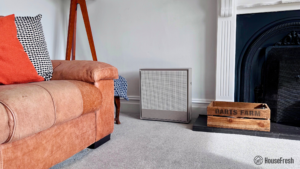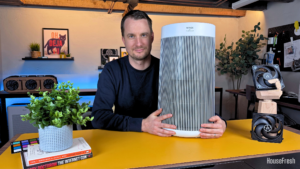The 4 Pro is a mid-sized air purifier from Xiaomi, available across Asia, Europe and some countries in South America.
It comes with app support through Xiaomi’s Mi app and smart functionalities such as sleep mode and auto-mode. It also has an on-board laser particle sensor, a temperature sensor and a humidity sensor that feed live data through the app and also on screen. In terms of filtration technologies, the 4 Pro has a cylindrical particle filter with 650 grams of pelleted carbon and comes with an ionizer that can be disabled.
The overall score for the Xiaomi 4 Pro incorporates first-hand data results from our battery of tests, as well as our ratings for customer service, brand transparency and design & UX. Check out the full scorecard below to see the split of categories.
The pros and cons of the 4 Pro
A summary of our top-level findings after testing this air purifier following our methodology.
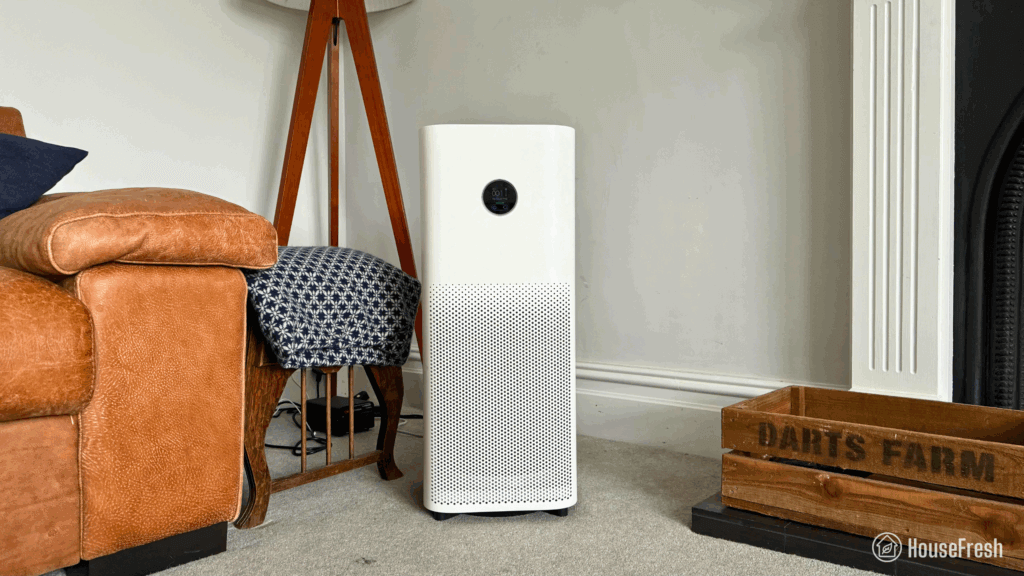
“The Xiaomi 4 Pro offers good value for money, with air cleaning performance scores that much more expensive air purifiers like the Levoit Core 400S and the Coway Airmega 250S.
The only fly in the ointment is that the in-built ionizer can only be disabled through the app.”

HouseFresh Founder
& Lead Tester
CONS
PROS
| Clean air delivery rate (CADR): | – Top speed PM1 CADR: 285 cfm – Sub-45 dBA PM1 CADR: 174 cfm |
| Filter technology: | Particle filter with 650g of activated carbon pellets and optional ionizer function |
| Recommended room size: | 448 sq. ft. (5 air changes per hour) |
| Dimensions: | 10.8 x 10.8 x 26.7 in (27.5 x 27.5 x 68 cm) |
| Weight: | 15 lbs (6.8 kg) |
| Noise level in decibels from 3 ft. away: | Sleep: 35.3 dBA Speed 1: 35.5 dBA Speed 2: 35.3 dBA Speed 3: 44.5 dBA Speed 4: 53.2 dBA Top speed: 59.2 dBA |
| Electricity consumption in watts: | Standby: 1 watt Sleep: 4.4 watts Speed 1: 4.1 watts Speed 2: 5.4 watts Speed 3: 13.9 watts Speed 4: 26.6 watts Top speed: 45.9 watts |
| Filter lifespan: | 6-12 months |
| Manufacturer’s warranty: | 1 year |
| Country of origin: | China |
| Country of manufacture: | China |
Filtration technology
The Xiaomi Pro 4 features a particle filter packed with activated carbon that lasts between six and 12 months, and an ionizer function you can disable.
An all-in-one cylindrical pleated particle filter with a pre-filter mesh on the outside that you need to vacuum every few weeks.
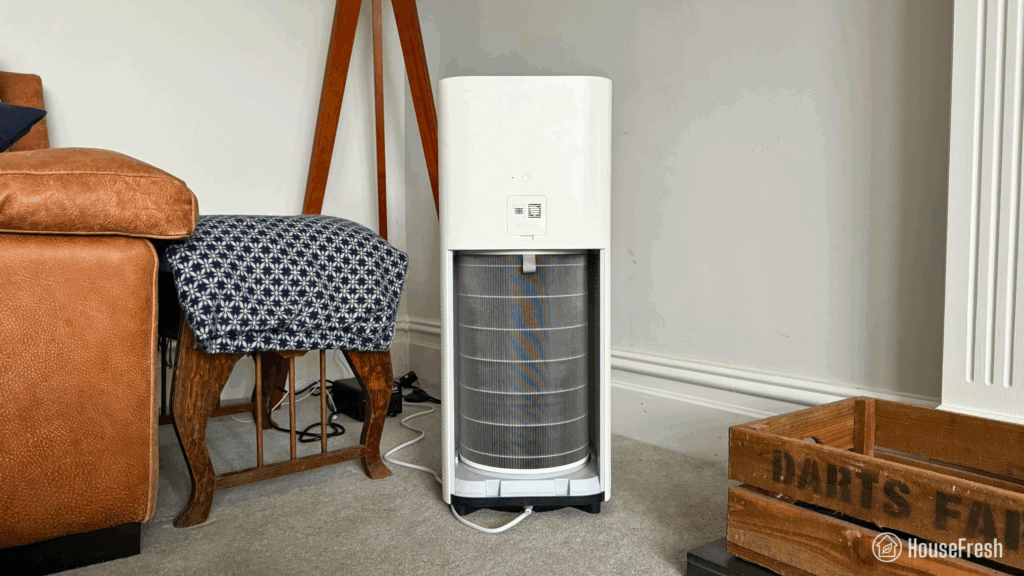
The filter comes packed with 650g of pelleted activated carbon that adsorbs odors and gases but that won’t be the best for serious VOCs.
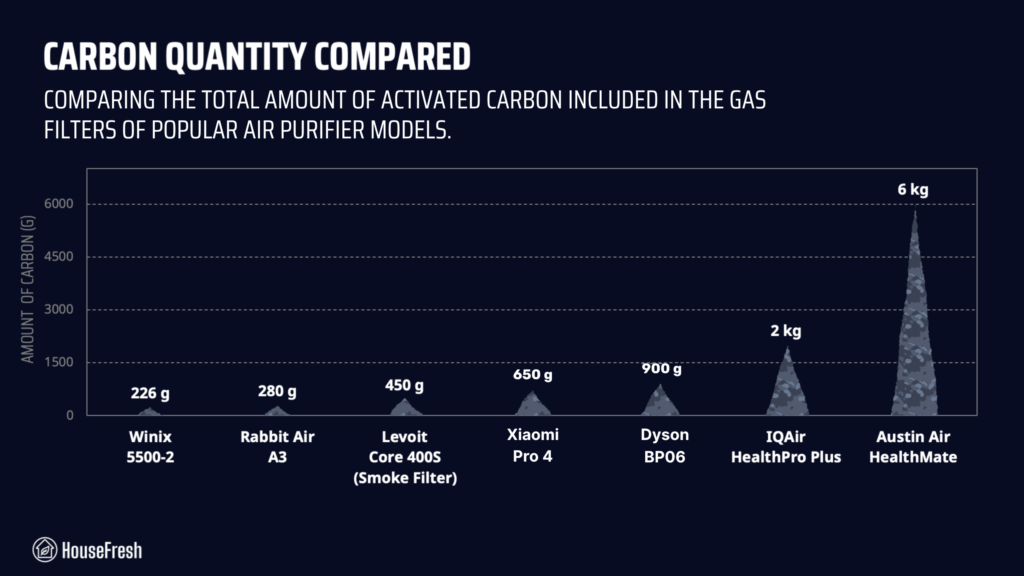
In addition to mechanical filtration, the Xiaomi 4 Pro has an ionizer that electrically charges air molecules to produce negative ions with the goal of attracting and neutralizing positively charged particles such as dust, pollen, bacteria, and other pollutants. This process generates small amounts of ozone.
The good news for those who want to avoid ionization are that the ionizer can be disabled through the Xiaomi app — although I would much prefer to get a button to disable it as you do with the Xiaomi Elite.
Design, controls and smart features
The 4 Pro is a smart air purifier you can control through an OLED screen and also from your phone.
You get an OLED screen at the front that displays air quality readings, temperature and humidity levels.
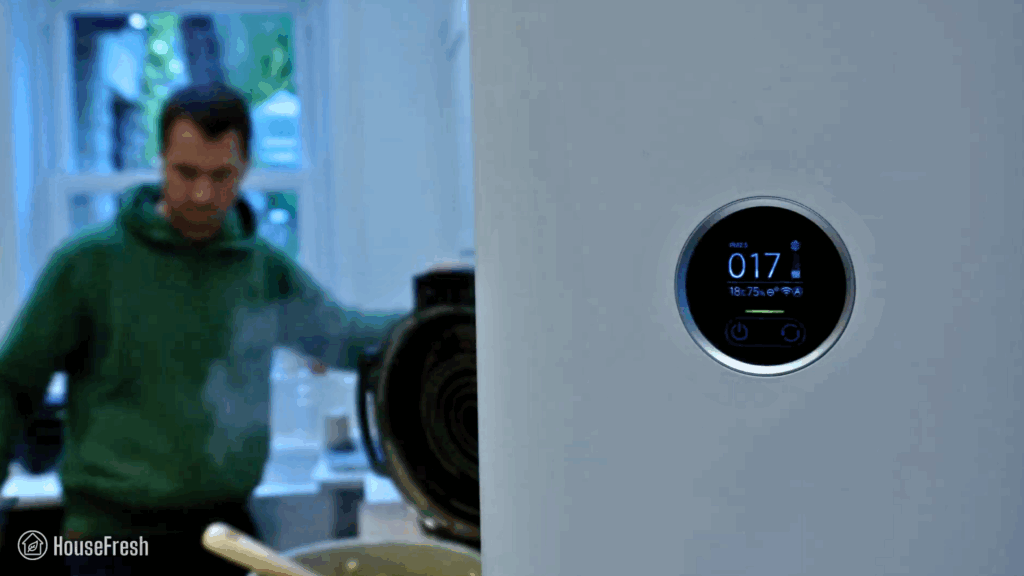
You also get a power button and a mode button to switch between sleep mode, auto mode, three fan speeds and ‘manual’ mode which you can set on the app.
You can also adjust the brightness of the screen tapping on a button that sits at the back of the device, right above the sensor.
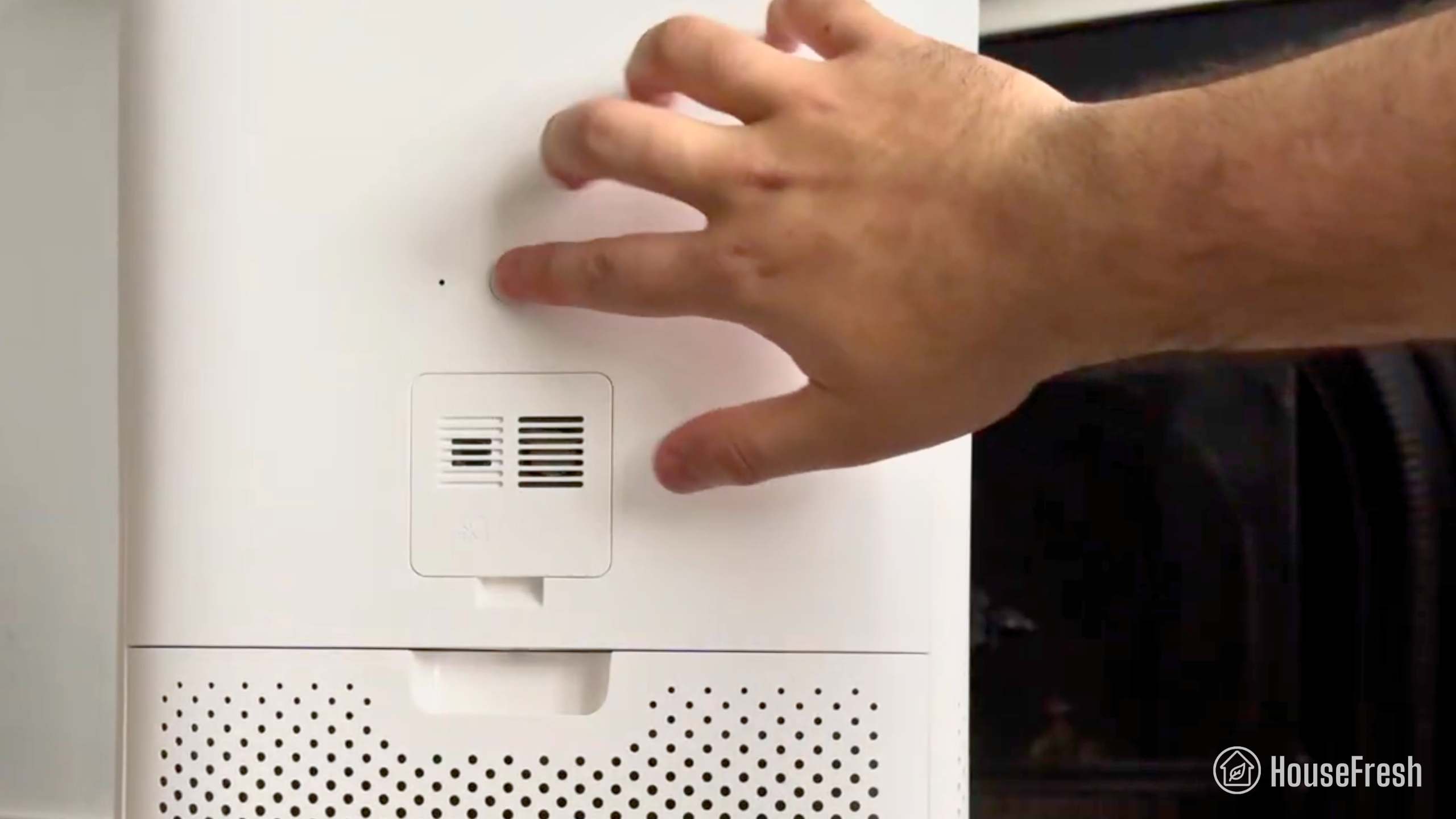
It connects to the Mi Home app, which is the same app you will use for other Xiaomi smart devices.
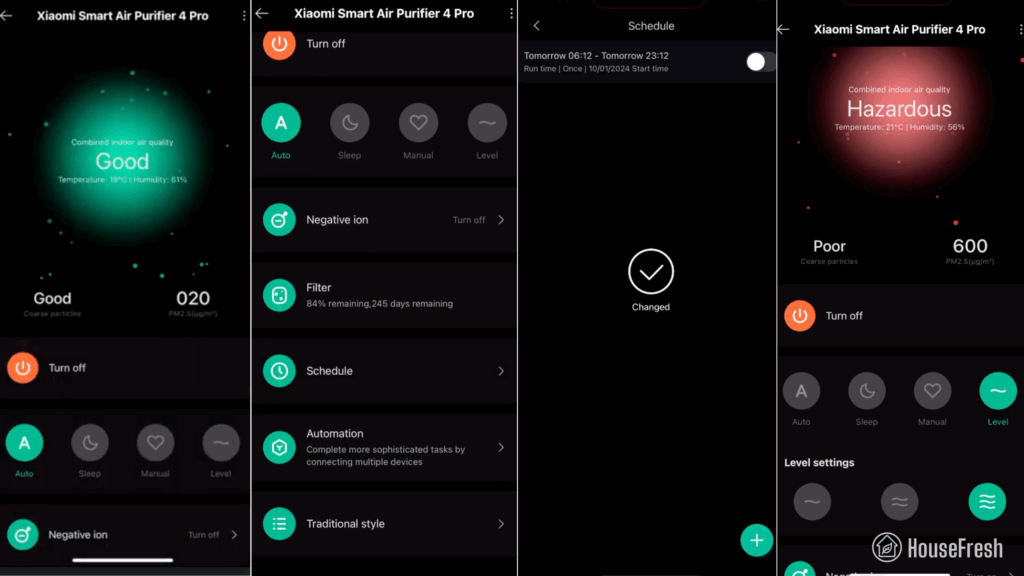
The app itself is slick and it works well. It displays real-time air quality readings and allows you to disable the ionizer, schedule routines and set your own ‘manual’ mode based on your coverage area.
I prefer the controls and app functionalities you get with the Xiaomi Elite. You get more buttons on screen and historical data in the app.
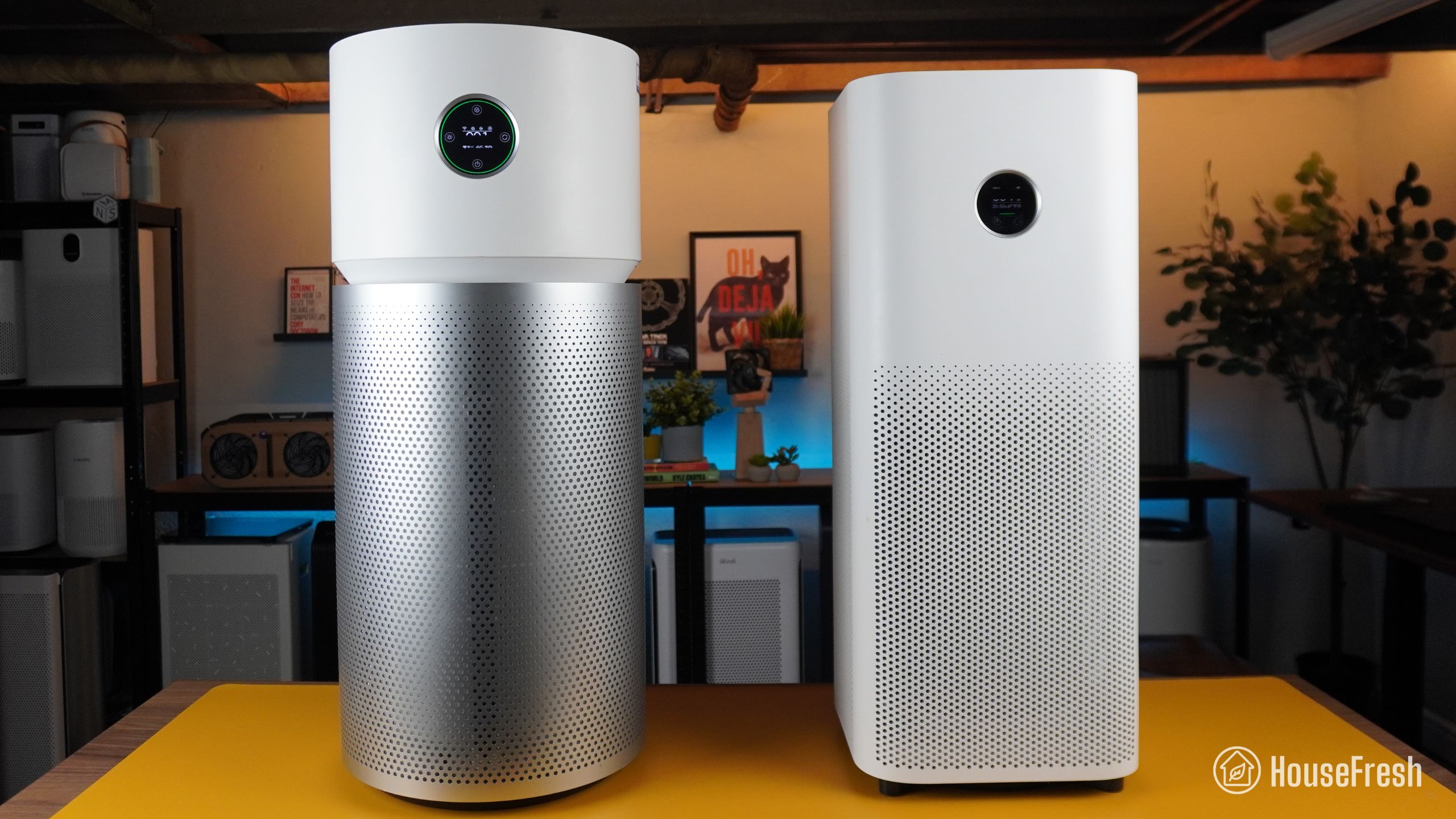
The Xiaomi Elite costs double of what you pay for the Pro 4, but is it worth the extra money or should you go for the Pro 4 instead? My tests show that air cleaning performance at sub-45 dBA speeds is exactly the same, but we estimate a CADR of 299 cfm a top speed for the Elite compared to a lower CADR of 285 cfm for the Pro 4 at full power.
The biggest difference, however, comes in the form of a more attractive, Dyson-inspired design, a more comprehensive control panel (which allows you to disable the ionizer with the touch of a button) and the ability to store air quality data on the app. If any of those things matter to you, then perhaps the Elite will be worth the upgrade, but watch my full review below before you decide.
Air cleaning performance
The Xiaomi 4 Pro matches the particle removal results we saw when testing popular units such as the
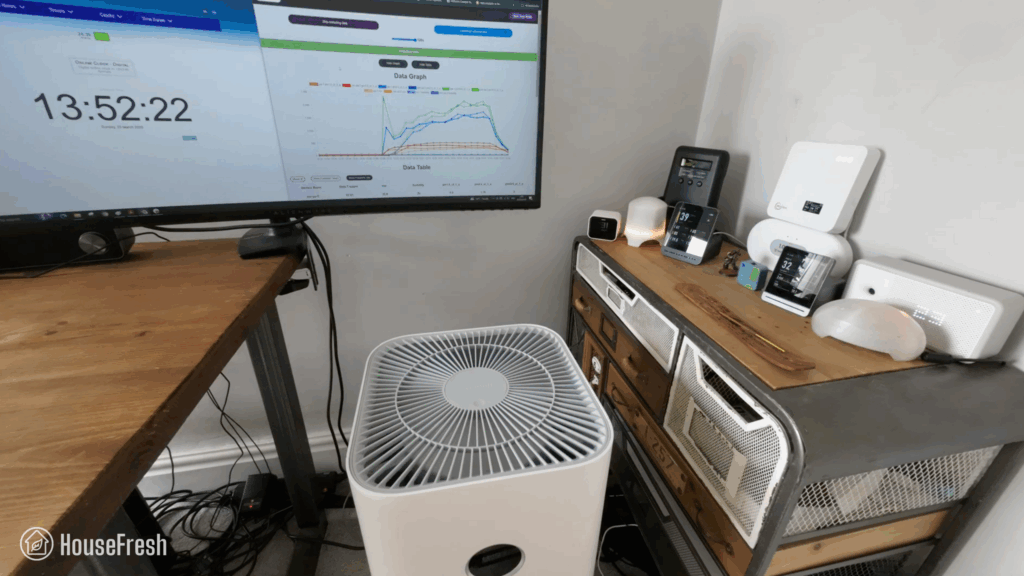
According to our PurpleAir Zen sensor, the Xiaomi Pro 4 needed 24 minutes to achieve PM1 zero in our 728 cubic ft. test room. We estimate a PM1 CADR of 285 cfm, which would allow the Pro 4 to provide five air changes per hour in rooms no larger than 448 sq. ft.
But this information in isolation won’t tell you much, so check out how this compares to other popular mid-sized air purifiers on the market today:
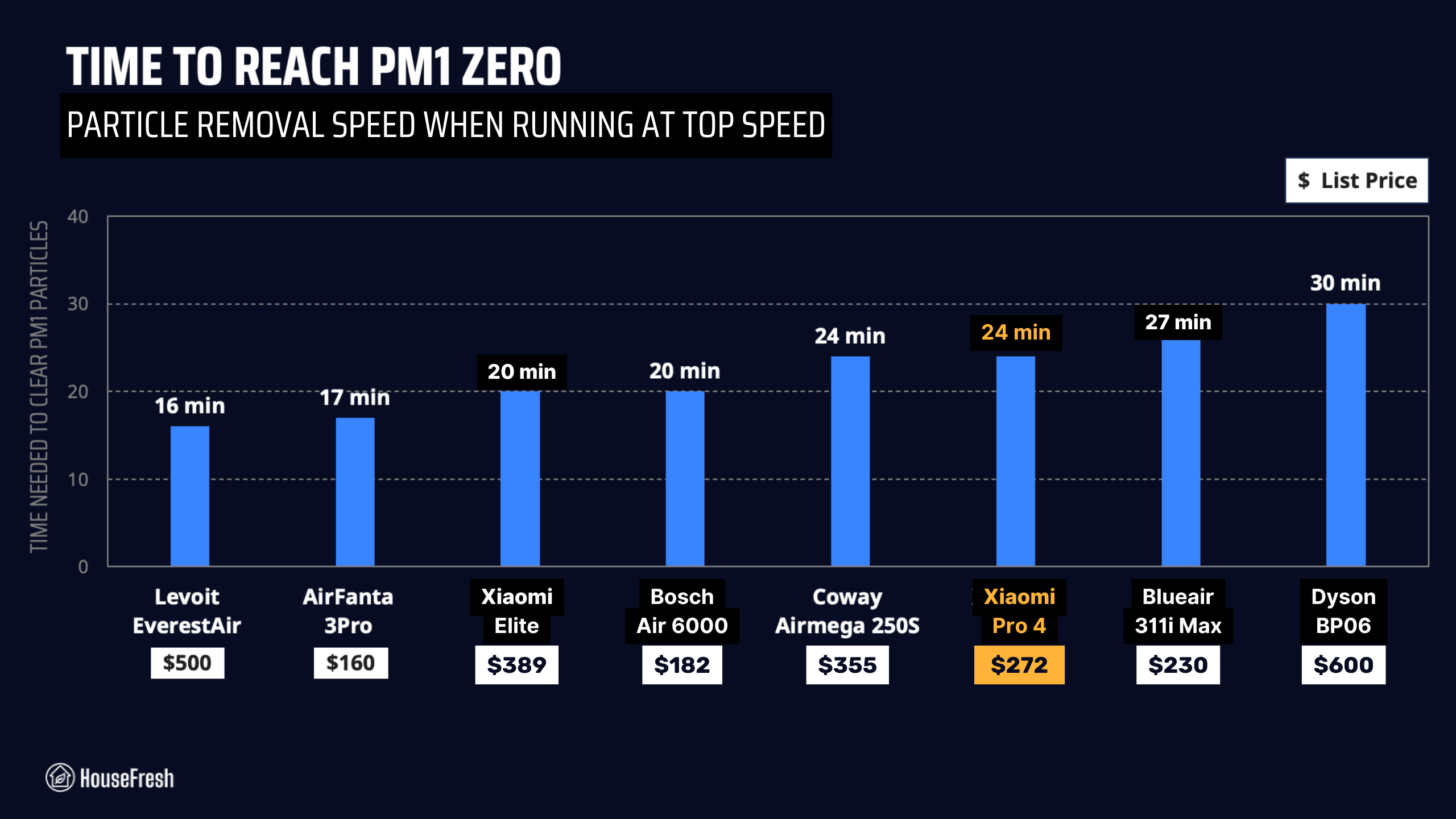
The Xiaomi Pro 4 completed our particle removal test faster than the much more expensive Dyson Big+Quiet BP06 (30 minutes) but slower than the cheaper AirFanta 3Pro (17 minutes). This is a decent result but if you are looking for an air purifier with solid air cleaning at a cheaper price, then you should definitely check out the 3Pro.
Sound levels
In our testing, the sound levels of the 4 Pro ranged from 35.3 dBA to 59.2 dBA. It is much quieter than the new Winix T810 (62.5 dBA) and the Coway Airmega 200M (64.3 dBA)
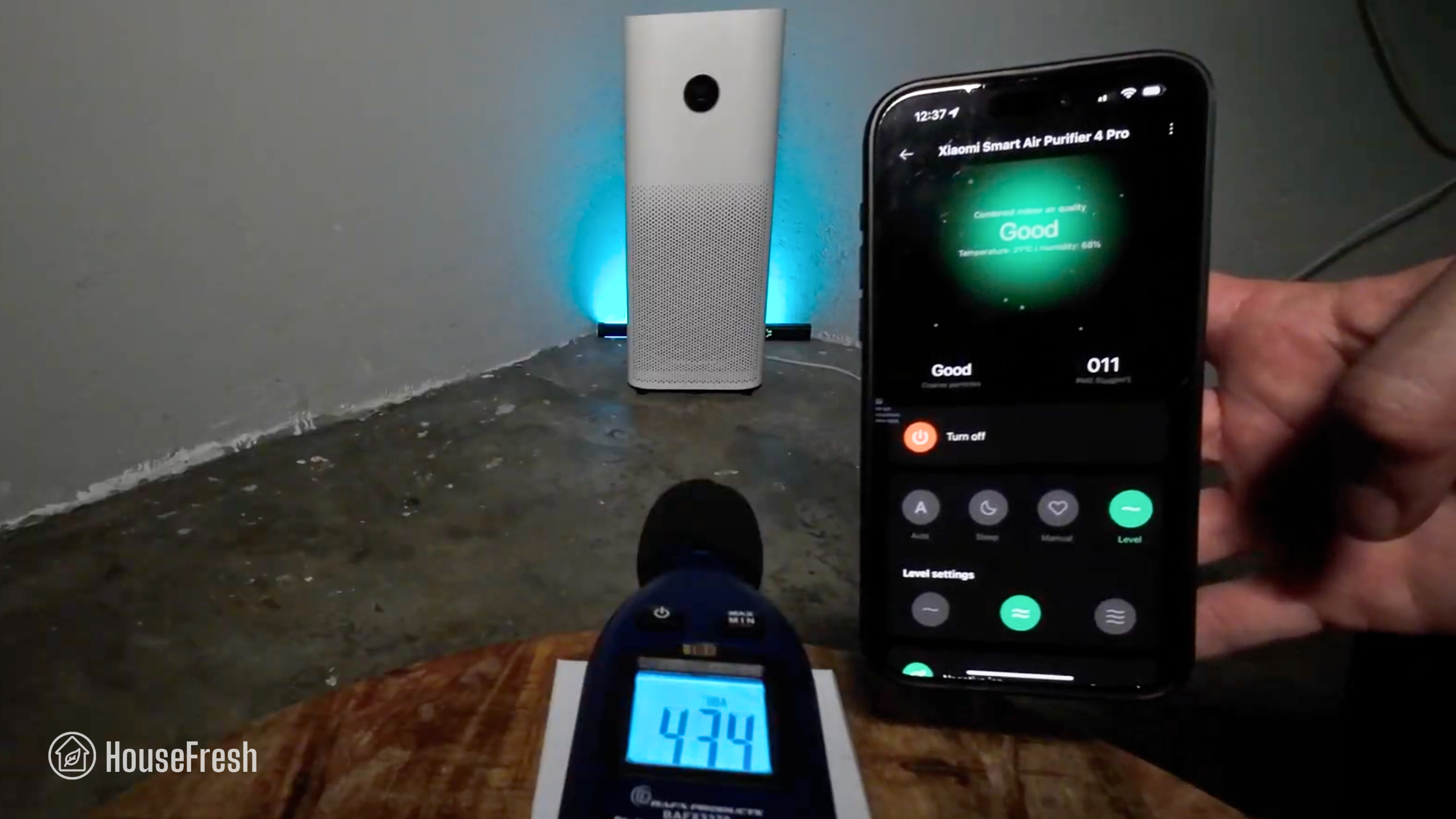
We used a sound level meter to measure how much noise our air purifiers generate at each fan speed.
At top speed, the Xiaomi Pro 4 reaches 59.2 dBA. Check out the chart below to see how this compares to other similarly-priced air purifiers running at top speed:
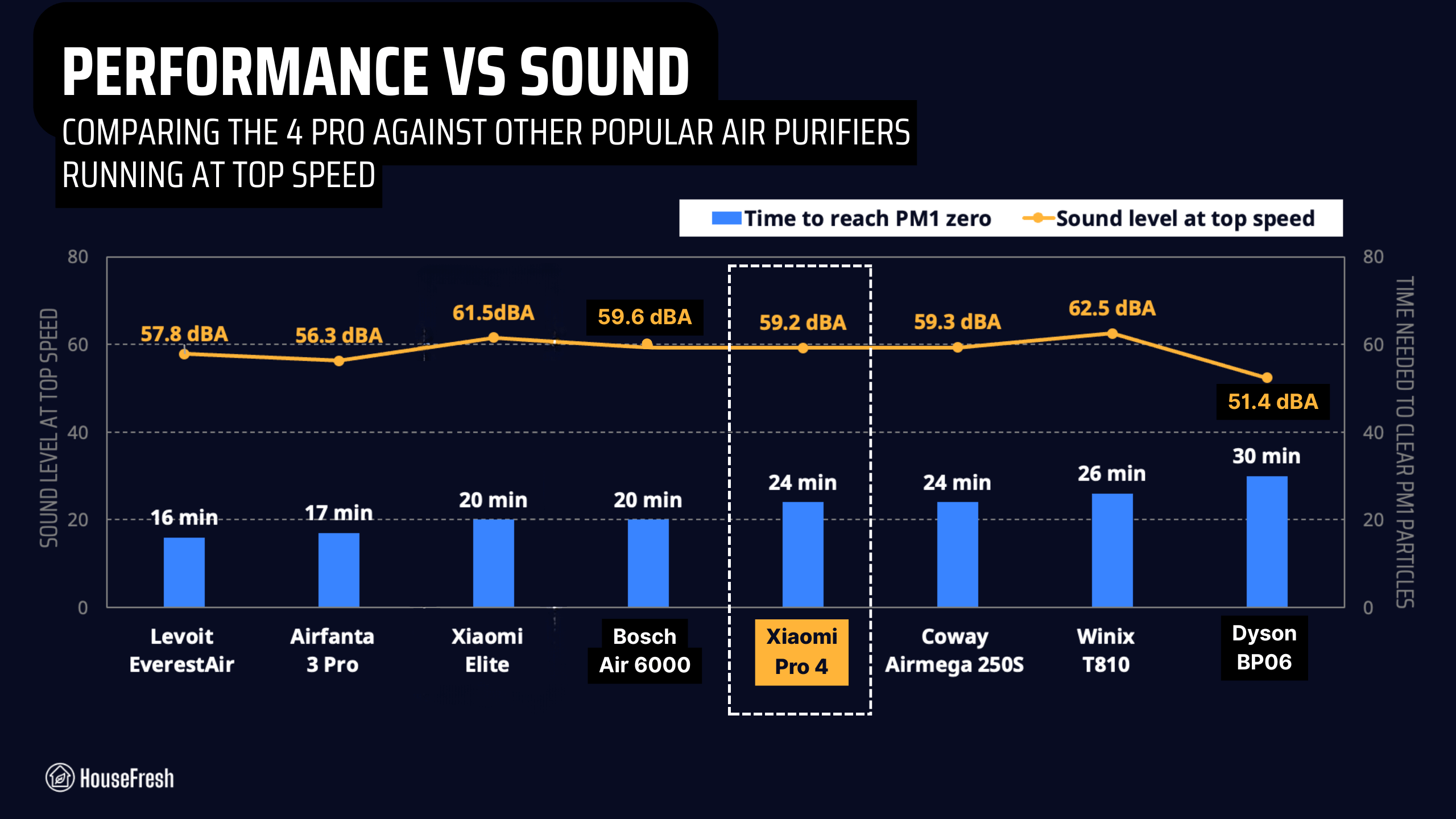
Completing our particle removal test in 24 minutes while generating just over 59 decibels is a good result, but it is also in line with what is expected for a mid-sized air purifier like the 4 Pro.
However, sound levels at turbo fan speeds are not as important as air cleaning performance at lower fan speeds.
That is why we always identify a fan speed where the air purifier generates less than 45 dBA of noise to assess its quiet performance.
Running at the Pro 4 at speed 2 (or 23-59 meters) generates 44.5 dB(A) of sound and it needed 34 minutes to complete our particle removal test.
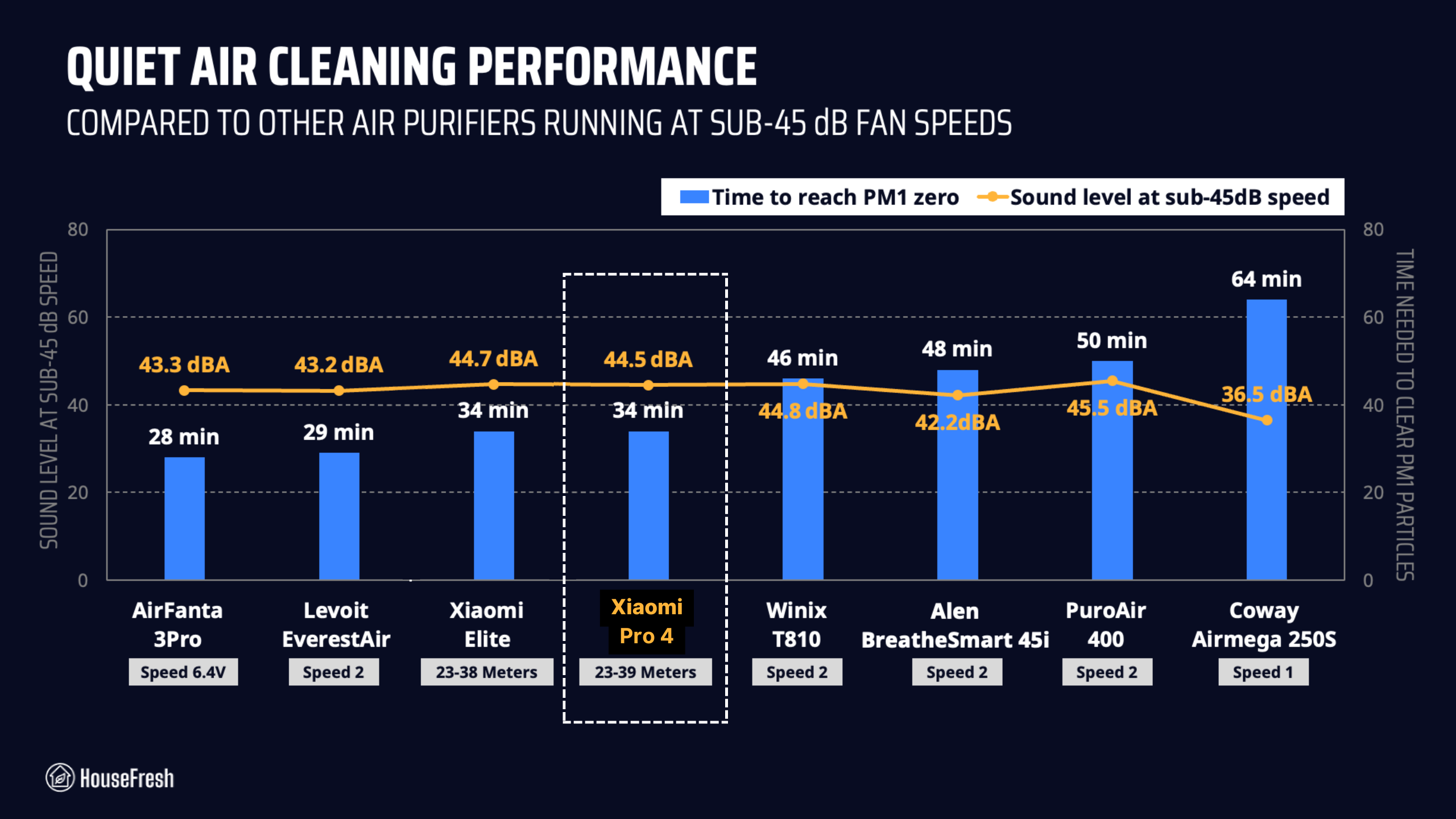
As you can see from the table, 34 minutes is the exact same result we saw when we tested the more expensive Xiaomi Elite, so even though the Elite has a higher CADR at top speed (299 cfm) but they both have the same sub-45 dBA CADR (174 cfm) so they could provide five air changes per hour in rooms up to 261 sq. ft.
Long-term running costs
Running a Xiaomi 4 Pro will cost you $162.24 per year, combining energy consumption costs and filter replacement prices.
As always, we used our energy meter to measure how much electricity the 4 Pro uses when running at each fan speed and also while on standby. Energy consumption ranges from 4.4 watts on sleep mode to 45.9 watts when running at top speed.
This means that if you had to leave your 4 Pro running 24/7 at top speed, it would cost $51.10 in energy costs for a year, using average U.S. energy rates.
Considering you need to replace the filter every six months and that the replacement costs $55.57, you can expect to also spend $111.14 per year on filters.
When compared to other similar-performing air purifiers, the 4 Pro is generally cheaper to run, thanks to its low energy usage and low-cost OEM filters:
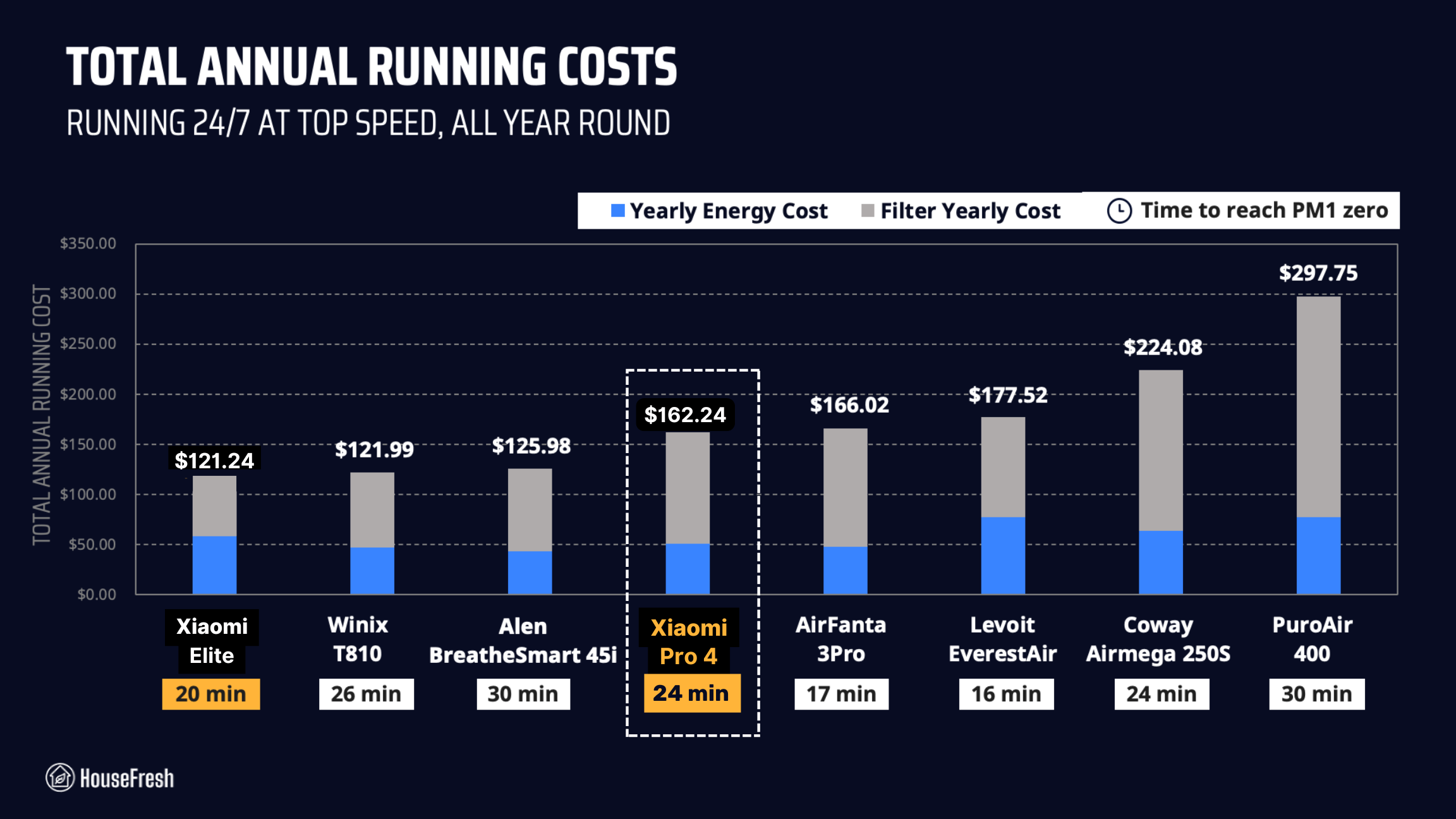
There are many generic filters available, starting at £39.22 (or $28.55) when you buy two. As they don’t use a HEPA grade or pelleted activated carbon the generic filters could offer a good option for those wanting to save money. We have shared performance test results with our Pro 4 using PUREBURG filters with our Patreon supporters here.
Bottom line: Should you get the Xiaomi Pro 4?
A good option for those living in the UK, Asia and other parts of Europe looking for a mid-sized air purifier with smart functions and app support for under €250 or just over £200.

This Xiaomi air purifier is faster at cleaning the air at top speed (21 minutes) than the pricier Dyson Big+Quiet BP06 (30 minutes), and its quiet performance at sub-45 dBA matches the pricier Xiaomi Elite (both with a PM1 CADR of 174 cfm at speed 2).
Both points go to show that the 4 Pro offers excellent value for its price (£210 in the UK and €247 in Europe), especially considering long-term running costs are also cheap compared to most other mid-sized air purifiers.
Plus, it comes with app support, an air quality sensor and displays not only air quality but also temperature and humidity measurements on its OLED screen. And it can be connected to Google Home and Alexa, so it could be a great choice if you are looking for an air purifier for your smart home.
If you’ve got the extra budget and are a fan of Xiaomi already, check out the Xiaomi Elite. You’ll get everything you get with the 4 Pro with improved performance at top speed and lower yearly running costs thanks to a longer lasting filter.
I really wish you could disable the ionizer with a button on the control panel instead of having to open the app to do it. And I also noticed that the fan motor makes a high-pitched whining noise at low fan speeds, which in our case means we had to take this air purifier out of our room because it was disturbing our sleep.
If those two things would nag you too but are set on a smart air purifier, then check out the Winix T810 and the Levoit Core 400S, both of which sell for a similar price than the 4 Pro, come with app connectivity and offer good air cleaning performance. And if you’re not bothered by smart functionalities, then you should definitely consider the AirFanta 3Pro as it offers a higher CADR (353 cfm) for a lower price ($160).
By the way, if you decide to buy a Xiaomi 4 Pro and want to support the work we do at HouseFresh, please use this link so we can earn a commission at no extra cost to you.
Thank you so much for taking the time to read my review. Did I miss anything? Please drop a comment below and I’ll reply as soon as I can.




